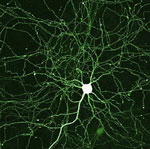UT Dallas researchers recently demonstrated how nerve stimulation paired with specific experiences, such as movements or sounds, can reorganize the brain. This technology could lead to new treatments for stroke, tinnitus, autism and other disorders. In a related paper, The University of Texas at Dallas neuroscientists showed that they could alter the speed at which […]








Recent Comments